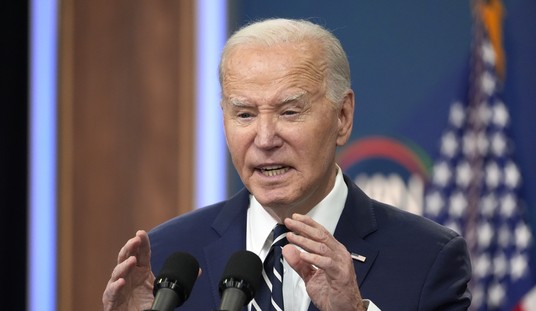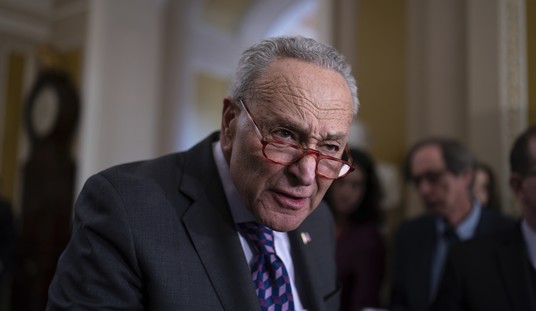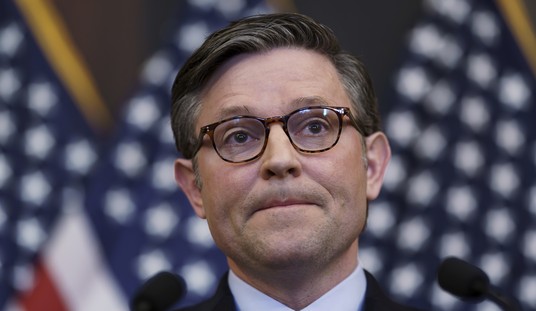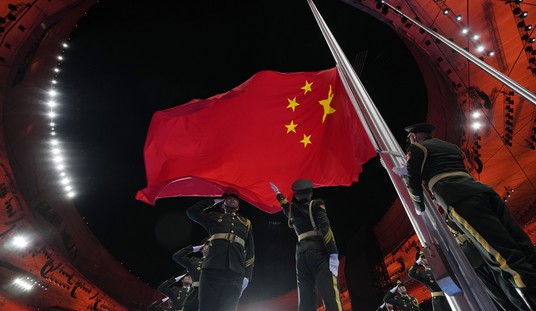
Senate Foreign Relations Committee Chairman Sen. Bob Corker, R-Tenn., left, and Ranking Member Ben Cardin, D-Md., speak to reporters on Capitol Hill in Washington, Tuesday, April 14, 2015, following a 19-0 committee vote unanimously approving a bill that would give Congress a say about the emerging deal aimed at preventing Iran from developing nuclear weapons in exchange for sanctions relief. (AP Photo/Manuel Balce Ceneta)
Today the Trump administration informed Congress that it is not imposing new sanctions on Russia. From the reaction in parts of Twitter, you’d have thought the First Guards Tank Army had just rumbled ashore in Georgetown.
I’m going to confess to not completely understanding the Countering America’s Adversaries Through Sanctions Act. Having said that, I can read English and I do have access to the internet, which apparently puts me head and shoulders above most of the people talking about the issue today.
The bill in question Public Law 115-44, was passed by the House and Senate and signed into law on August 5. Let’s not sugarcoat this. The bill, which targets Iran, Russia, and North Korea, passed by large veto-proof majorities. President Trump bowed to the inevitable and begrudgingly signed the law. He wasn’t happy about it and if the votes and been more partisan, he probably would have vetoed it. He viewed it, rightly, in my view, as Congress playing in the foreign policy sandbox and requiring certain actions whether the administration thought them prudent or not. That’s life in the big city.
The first misconception is that the bill requires the imposition of new sanctions. It doesn’t. It clearly encourages sanctions but it sets criteria by which the executive branch is supposed to make a determination and it clearly gives the executive the leeway to pass on imposing new sanctions if it makes a representation to Congress that they aren’t needed. If Congress disagrees, the law says they can force the issue by voting to impose sanctions. I’m resorting to Wikipedia here for sake of brevity, but you’ll see that the only action the president is required to take is to leave existing executive orders imposing sanctions on Russia and Russians in place. Everything else can be waived.
The Trump administration informed lawmakers Monday that new Russia sanctions called for in a bipartisan bill passed last year are not necessary yet because the measure is already “serving as a deterrent.”
The announcement came as lawmakers in both parties nudged the administration to implement sanctions legislation that passed overwhelmingly in July — with only five no votes in both the House and Senate. The sanctions bill requires the imposition of penalties by Monday against entities doing “significant” business with Moscow’s defense and intelligence sectors, unless Congress is notified that prospective targets are “substantially reducing” that business.
A State Department spokesperson said by email that the administration is “using this legislation as Congress intended to press Russia to address our concerns related to its aggression in Ukraine, interference in other nations’ domestic affairs and abuses of human rights.”
Potential targets of future penalties “have been put on notice, both publicly and privately, including by the highest-level State Department and other U.S. government officials where appropriate, that significant transactions with listed Russian entities will result in sanctions,” the spokesperson added.
“Given the long time frames generally associated with major defense deals, the results of this effort are only beginning to become apparent. From that perspective, if the law is working, sanctions on specific entities or individuals will not need to be imposed because the legislation is, in fact, serving as a deterrent.”
In addition to the sanctions on entities doing business with Moscow’s defense and intelligence sectors, the sanctions law also called for the administration to produce by Monday a list of oligarchs linked to Russian President Vladimir Putin and a report on the consequences of sanctioning Russia’s sovereign debt. The sanctions law was crafted partially in response to Russian meddling in the 2016 election.
The administration released the unclassified version of the oligarchs list late Monday, after its announcement on the non-issuance of new sanctions. The Treasury Department noted that the roster “is not a sanctions list” and that individuals listed do not “meet the criteria for designation under any sanctions program” as a result of their inclusion.
The list named 114 “senior political figures” in Putin’s government, as well as 96 oligarchs with close ties to Moscow. It is unclear whether Congress received the sovereign debt report also due Monday, which is likely to contain classified information. The State Department spokesperson added: “Further details are contained in a classified report we have submitted to Congress.”
I understand why people who wanted more sanctions on Russia for sh**s and grins were disappointed but I don’t understand why that disappointment matters. Unlike what morons like Claire McCaskill are saying
Congress voted 517-5 to impose sanctions on Russia. The President decides to ignore that law. Folks that is a constitutional crisis. There should be outrage in every corner of this country.
— Claire McCaskill (@clairecmc) January 30, 2018
there was no legal obligation to impose sanctions.
This is what Maryland Senator Ben Cardin, the ranking Democrat on the Foreign Affairs Committee, has to say:
“The Russia sanctions law includes a provision which mandates sanctions on those who conduct significant transactions with the Russian defense and intelligence sectors unless they can show substantial reductions in this trade.
“The administration provided a classified staff briefing today on U.S. diplomatic efforts toward this end and I appreciate the administration’s engagement with Congress on this issue. I am not going to discuss the classified nature of these discussions but I am intently focused on these sanctions and will continue to conduct rigorous oversight to ensure that the Russian government’s ability to conduct this trade is significantly impeded.
“The U.S. should be prepared to impose sanctions when the law is clearly violated. The administration should not rest in these efforts and I expect a frequent and regular dialogue on this issue.”
Senator Bob Corker, the Republican chairman of the Senate Foreign Relations Committee, one of the main congressional architects of the sanctions law, said he was not concerned that the administration did not announce sanctions by Monday’s deadline.
“This is when sanctions season begins, and so they’ll be rolling them out,” he told reporters.
“We feel pretty good about the process,” Corker said. “They’re rushing the information over to us today, and by the close of business, they’re going to have two of the three, as I understand it. So they’re taking it very seriously.”
And this thread from Axios’s Jonathan Swan…not a Trump fan by any stretch of the imagination:
https://twitter.com/jonathanvswan/status/958352986648072193
Corker last night: “This is just the begining of sanctions seasons as it relates to that bill…I’m not sure what there is to be hugely upset about.” https://t.co/WZinYuqP8s
— Alan He (@alanhe) January 30, 2018
https://twitter.com/jonathanvswan/status/958353620906532865
While I understand the political gimmickry of this law, I’ve never understood the practical use of it. The Treasury sanctions Russians and Russian entities on a regular basis. From last Friday:
The Treasury Department on Friday targeted 21 individuals and nine entities with financial sanctions for their support of Russia’s occupation of the Crimea region of Ukraine.
Treasury’s Office of Foreign Assets Control (OFAC), which administers sanctions, banned more than a dozen Russian government officials, Russian business executives and Ukrainian separatist leaders involved with Russia’s occupation. OFAC also sanctioned nine technology, construction and shipping firms supporting the occupation.
The 32 targeted individuals and firms are banned from the United States financial system, and barred from using the U.S dollar. All of their assets subject to U.S. jurisdiction will be frozen.
“The U.S. government is committed to maintaining the sovereignty and territorial integrity of Ukraine and to targeting those who attempt to undermine the Minsk agreements,” said Treasury Secretary Steven Mnuchin.
“Those who provide goods, services, or material support to individuals and entities sanctioned by the United States for their activities in Ukraine are engaging in behavior that could expose them to U.S. sanctions.”
The department targeted 11 leaders of the Donetsk People’s Republic (DPR), a Russian-backed separatist government claiming control over part of Crimea. The targeted officials include DPR’s “ministers” of information, industry and trade, finance, foreign affairs, state security, justice and taxes.
I don’t have the information available to determine if sanctions were appropriate or not…and neither does anyone else writing about this. It is simply a Rorschach test for your views on the Russia-collusion conspiracy theory.
My assessment: the administration answered the mail on this to the satisfaction of the main players on the issue in both parties. The administration didn’t violate the law. The criticism on this is based, best casing it, on unfamiliarity with what the law requires and a failure to even try to find out what the requirements are, and, more frequently, a desire to continue to keep the Russia-collusion narrative alive.














Join the conversation as a VIP Member